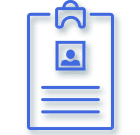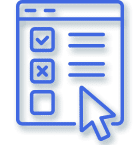What does an Addiction Counselor in North Carolina do? What is Their Job Role?
A certified substance abuse counselor is a licensed professionals with special knowledge and skills that allow them to assist individuals who struggle with alcohol and drug abuse and/or addiction. Practicing substance abuse counselors must receive special training in a variety of areas, including patient assessment, diagnosis, and evaluation, as well as be able to conduct individual and group substance abuse counseling sessions. Additionally, these North Carolina professionals are familiar with the best practices in both the intervention and referral process.
Compare Popular Online Substance Abuse Counseling Programs
North Carolina Licensing & Certifications for Associates & Independent Counselors

In order to ensure that all practicing substance abuse professionals in the state of North Carolina possess the necessary knowledge, skills, and ethical commitment, the North Carolina Substance Abuse Professional Practice Board (NCSAPPB) was established. The NCSAPPB is responsible for providing counseling credentials to qualified individuals within the state. As a member board of the International Certification and Reciprocity Consortium (IC&RC), the NCSAPPB works to ensure substance abuse and/or addiction patients receive safe and competent services. To this end, they offer several different credentials. Those who have already received certification from another IC&RC member board can transfer their credentials to North Carolina through the reciprocity process.
Certified North Carolina Substance Abuse Counselor (CSAC)
CSAC is the first of two counseling credentials offered by the NCSAPPB. A CSAC is certified to perform the 12 Core Functions including, but not limited to, screening, intake, referral, and North Carolina substance abuse counseling services. Those interested in becoming a CSAC must:
- Have a high school diploma or equivalent
- Have a clean conduct record
- Upload a current resume, NCSAPPB’s Ethics Agreement, and current job description
- Pay the non-refundable registration fee of $125
- Complete a 300 hour supervised practicum
- Complete a three hour ethics training course
- Complete 6,000 hours of supervised practice
- Complete 270 hours of NCSAPPB-approved education and training, including:
- 190 hours of substance abuse education
- Six hours of HIV/AIDS/STDS/TB/Blood-borne pathogens training and education
- Six hours of professional ethics education
- Six hours of education in nicotine dependence, psychopathology, evidence-based treatment approaches, substance abuse issues in older adults, substance abuse issues affecting veterans
- Provide contact information for two professional references, either co-workers or colleagues
Licensed Clinical Addictions Specialist (LCAS)
An LCAS is certified to practice independently while performing the same tasks as a CSAC. Those with LCAS credentials are also qualified to supervise other North Carolina certified substance abuse counselor candidates.
There are four ways to qualify to apply for North Carolina licensure as an LCAS. It’s recommended that you contact the NCSAPPB prior to making your criteria selection to ensure the correct one is chosen:
- Criteria A
- For individuals with a master’s degree who have substance abuse counselor training and supervision experience
- Criteria B
- For individuals with a master’s degree who already hold certification as a CSAC
- Criteria C
- For individuals with a master’s degree which includes a substance abuse counselor specialty curriculum that was preapproved by the NCSAPPB
- Criteria D
- For individuals with a certified substance abuse counselor specialty from an affiliated Deemed Status profession, such as Certified Rehabilitation Counselor, American Psychological Association, or Addiction Nursing Certification Board
While requirements vary depending on your selection, they generally include:
- Master’s degree
- 300 hours of supervised practical training
- Three hour ethics training
- 4,000 hours of supervised post-graduate substance abuse counseling experience
- 180 hours of certified substance abuse counselor training
- Passing score on a master’s level IC&RC AADC written examination
- Agreement to adhere to NCSAPPB’s Code of Ethical Conduct
- Three letters of reference from other LCAS or CSAC professionals with master’s degrees
- $125 non-refundable registration fee
Certified Substance Abuse Prevention Consultant (CSAPC)
This credential is ideal for those who intend to provide prevention education, including alternative activities, community networking, and referrals. Requirements include:
- A high school diploma or equivalent
- A clean conduct record
- Uploading a resume, Ethics Agreement, and job description
- Paying the non-refundable registration fee of $125
- Completing a three hour ethics training
- Completing a 300 hour supervised practicum, including the Prevention Performance Domains:
- Planning and Evaluations
- Education and Skill Development
- Community Organization
- Public and Organizational Policy
- Professional Growth and Responsibility
- Completing 270 hours of NCSAPPB-approved education including:
- 170 hours in primary prevention and life skills training
- 100 hours in substance abuse, including six hours of infectious disease education and six hours of nicotine dependence, psychopathology, evidence-based treatment approaches, substance abuse issues in older adults, or substance abuse issues affecting veterans education
- Paying the non-refundable examination fee of $125
- Successfully passing the examination
Certified Criminal Justice Addictions Professional (CCJP)
North Carolina individuals interested in addiction as it relates to criminal behavior may be interested in the NCSAPPB’s specialty credential of CCJP. This certification deals with legal, ethical, and professional responsibility, as well as the criminal justice system and processes. Certified substance abuse counselor candidates must:
- Have a high school diploma or equivalent
- Have a clean conduct record
- Upload a resume, Ethics Agreement, and job description
- Pay the non-refundable registration fee of $125
- Complete a three hour ethics training
- Complete a 300 hour supervised practicum
- Complete 270 hours (or 180 hours if the candidate has a master’s) of NCSAPPB-approved education and training related to the IC&RC criminal justice addictions professional specifications
- Pay the non-refundable examination fee of $125
- Successfully pass the examination
Certified Clinical Supervisor (CCS)
The NCSAPPB also offers a specialty certification for individuals who want to train and identify substance abuse supervisors. Those with this credential often provide supervision to:
- Individuals seeking certification in counseling, clinical mental health counseling, criminal justice addictions specialization, prevention counseling, and licensed clinical addiction specialists
- LCAS seeking clinical supervision
- CSACs and CCJPs who still require supervision
Those interested in becoming a CCS must:
- Have a master’s degree
- Pay the non-refundable application fee of $25
- Upload a resume, Ethics Agreement, and job description
- Pay the registration fee of $125
- Complete 15 hours of:
- Clinical supervision training
- Substance abuse clinical supervision training
- Complete 4,000 hours of clinically supervised practice
- Submit three letters of reference, one from a substance abuse professional who can confirm the candidate’s supervisory competence
- Pay the non-refundable examination fee of $125
- Successfully pass the Supervision Examination
CACREP Accredited Online Certification

Two types of certified substance abuse counselor accreditation are recognized in the United States; institutional and specialized. Institutional clinical mental health counseling accreditation takes the entire institution into account while the specialized focus on professional preparation programs. The Council for Accreditation of Counseling and Related Educational Programs (CACREP) is a specialized accreditation that focuses on master’s and doctoral degree programs in substance abuse counseling at colleges and universities worldwide. Only already-accredited institutions are eligible for CACREP review. The review for accreditation will center on programs offering graduate degrees in substance abuse counseling.
Find Your Online Addiction Counseling Program
Choosing a CACREP-accredited program ensures that the program meets the highest of quality standards. Many counseling specialties are accredited bythe CACREP, including addiction counseling and clinical mental health counseling. Accredited addiction counseling programs prepare individuals to work with those affected by addictive behavior and their families. Addictive behaviors include alcohol, drugs, food, gambling, sex, and anything else that negatively affects your personal or work life by creating addiction behaviors.
CACREP-accredited programs will focus on treatment models and the phases of addiction including prevention, recovery, and relapse prevention. These 60-semester hour programs will include the application of interventions. When students choose a CACREP-accredited program they can be confident that:
- the program meets or exceeds national standards
- the program will focus on professional counseling rather than psychology oreducation
- the program has an excellent reputation
- CACREP graduates statistically receive higher scores on the National Counselor Examination for Licensure and Certification (NCE).
- the requirements for licensure will be met.
Board of Licensed Professional Counselors (NCBLPC)
The mission of the NCBLPC is to regulate any persons offering substance abuse counseling services in the state. The Board exists to protect the health, safety, and welfare of the public and is responsible for administering and enforcing national standards of North Carolina counselor preparation and ethical practices defined by the National Board of Certified Counselors (NBCC). NBCC testing, the National Counselor Examination (NCE), is used by North Carolina to determine the eligibility of licensure applicants. The Board also relies on standards set by the Council for Accreditation of Counseling and Related Educational Programs (CACREP).
Address
P.O. Box 77819
Greensboro, NC 27417
Phone
(336) 217-6007
Website Address
Licensure:
- Licensed Professional Counselor (LPC)
- Licensed Professional Counselor Associate (LPCA)
- Licensed Professional Counselor Supervisor (LPCS)
Counselor Testing & Examination Process

Certified substance abuse counselor individuals in North Carolina seeking any of the above-mentioned credentials must complete and submit an application through the NCSAPPB website. This process is completely digital and requires internet access, electronic copies of all required documentation, familiarity with digital file uploading, and a credit card to pay the non-refundable $25 application fee. Regardless of your intended credential, follow this application procedure:
Create an account using the NCSAPPB’s Credentialing System online at http://ncsappb.learningbuilder.com. Be prepared to provide basic demographic information, such as your address, phone number, email, date of birth, and the last four digits of your social security number. After your account has been created, this is where you will be able to access and view any uploaded documents and staff communications.
Read the provided information about each offered credential to help you identify the one(s) that best fit your career goals and qualifications. If you need assistance selecting your credential, contact the NCSAPPB.
- Please note that LCAS applicants must have their official transcript(s) sent before proceeding with the application process.
Select your desired credential from the provided “Learning Plans.”
Designate whether you’re applying for credentials via a new application or are already certified in another state and wish to apply via reciprocity.
Pay the required $25 fee.
Complete the registration process for your desired credential. Once all of the required documentation has been submitted, the “Submit Application” button will turn orange. Click this button to complete the submission process.
Additionally, applicants are required to agree to a criminal background investigation by the State Bureau of Investigation. You’ll need to grant this permission by uploading a signed Release of Information form and submit the non-refundable processing fee of $38. As part of this process, you will need a LIVESCAN of your fingerprints. This can be obtained through your local law enforcement agency, which will require photo identification and, in some cases, an associated fee.
Candidates seeking credentials in North Carolina are also required to take the IC&RC examination, as designated by their intended credential. If you fail to receive a passing score on this computer-based, multiple-choice exam, you can retake it every three months after paying a re-examination fee of $150.
For most of the North Carolina credentials, the process for registering for the exam is as follows:
Log into your online account once your registration process is complete
Select the orange “Continue” button and select “Exam Forms”
Pay the non-refundable examination fee of $125
Request to take the examination; remember to request any needed testing accommodations
Wait to hear from the NCSAPPB via email and then click the included test link to register
Take the examination
Clinical Supervision Explained
Supervised practicums are required for CSAC, LCAS candidates with Criteria A, LCAS candidates with Criteria C, CCS, CCJP, and CSAPC credentials in order to achieve registered Intern Status. Candidates must complete a total of 300 hours of supervised work within the twelve core functions. In general, you must have one hour of supervision for every 10 hours of practice. Once this hour requirement is complete, you will need to return to your online portal and request evaluation. An online form will be sent to your supervisor(s) and he/she must complete and submit it.
In order to achieve full certification, most candidates will also need to practice under supervision for at least 2,000 to 6,000 hours, depending on the credentials being sought. In general, you must have one hour of supervision for every 40 hours of practice. Once this hour requirement is complete, you will need to return to your online portal and request evaluation. An online form will be sent to your supervisor(s) and he/she must complete and submit it.
Renewal and Continuing Education
Credentials received through the NCSAPPB must be renewed every two years. Continuing education and training vary depending on the certification in question. At most, those seeking renewal will need to complete the following:
- Complete 60 hours of NCSAPPB-approved education within the two-year certification period, including:
- 30 hours of substance abuse education
- Three hours of HIV/AIDS/STDS/TB/Blood-borne pathogens training and education
- Three hours of professional ethics education
- Three hours of education in nicotine dependence, psychopathology, evidence-based treatment approaches, substance abuse issues in older adults, and substance abuse issues affecting veterans
- Submit the renewal application
- Pay the non-refundable renewal fee of $125
- Establish a supervision contract with a clinical supervisor
- One hour of supervision for every 40 hours of practice for 4,000 hours
- One hour of supervision for every 80 hours of practice for the next 4,000 hours
- One hour of supervision for every 160 hours of practice afterward
Potential Counselor Career Path Options
- Addiction Counselor
- Alcohol and Drug Addiction Counselor
- Behavioral Health Specialist
- Certified Addiction Drug and Alcohol Counselor
- Chemical Dependency Counselor
- Mental Health Counselor
- School Counselor
- Substance Abuse Counselor
Associations & Organizations
The Association for Addiction Professionals of North Carolina (APNC) is the state affiliate of NAADAC, the Association for clinical mental health counseling and Addiction Professionals, which represents over 100,000 addiction professionals in the United States.
